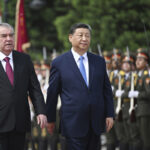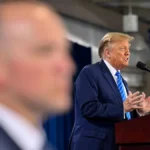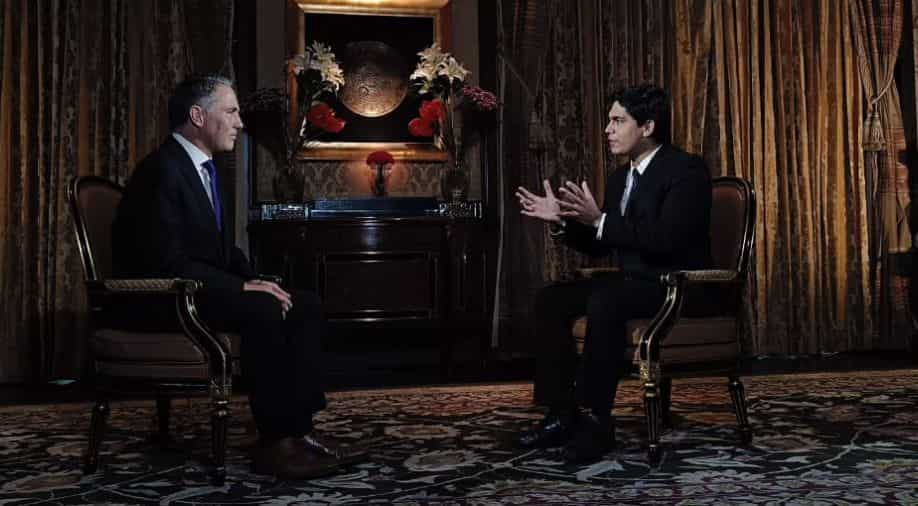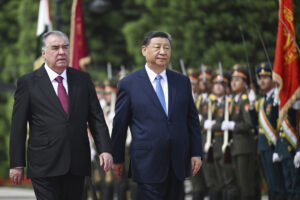Australia Deputy Prime Minister & Defence Minister Richard Marles has termed India as the centre of “global cricket” even as he pointed out that the game is “emblematic of the relationship”. The Deputy PM was present at the Ahmedabad Cricket World Cup finals, representing his country. Speaking to our diplomatic correspondent Sidhant Sibal, he said, “I spoke to Australian cricketers after that in the dressing room, if they had heard something like before. What is clear now is that for Australia Cricket, India is so familiar….”.
The defence minister is in Delhi for key India-Australia 2+2 at foreign and defence ministers level. He said, Australia shares a “huge strategic alignment with India” and also “comfort, the trust”, pointing to increased interoperability between the militaries of the two sides. On Chinese aggressiveness, he pointed out, “we are seeing a Chinese assertiveness as you say, we’re seeing a huge military buildup by China”. He also spoke on Quad, Aukus.
Here is the text of the full interview.
WION: Talking about this relationship, yes, cricket diplomacy is one of the elements and our team also played very well. But essentially, how do you characterize this relationship? We saw the Defense strategic review talking about increasing engagement with India so what kind of engagement you’re looking at, especially in terms of training, in terms of Indian participation in Australian exercises?
Richard Marles: Well, perhaps to go back a step and think about at the highest level, we see that we have a huge strategic alignment with India, and we have shared values with them. I mean, you know, for both Australia and India, our largest trading partner is China. Our biggest security anxiety is China. So we share something very similar. We share an ocean and in that sense, we live in the same neighborhood but we also share values, that we’re both democracies. We both have freedom of speech, the rule of law, and a whole lot of things in common, including cricket. And you put all that together. And what becomes really clear is that from our perspective, and I think and hope from the Indian perspective as well, the significance of this relationship going forward, at a very strong base is hugely important for us and defence is a key component of that. So we are seeing a much greater tempo of exercises. We’ve seen Malabar for the first time happen in Australian waters and I was able to meet Indian Admiral also on Sydney Harbor this year. Exercise AUSINDEX and AUSTRA HIND, are all happening this year. Observers at exercise Talisman Sabre. So you have significant tempo off exercises, building a familiarity, interoperability between our defence forces, a comfort of a very strong base which does underpin the significance of the relationship.
WION: So greater strategic alignment. So are you looking at any agreements and both have become security partners, u were on board the Indian Navy’s P8, which is a sensitive platform
Richard Marles: Yes, and coming to India was the first bilateral visit which I did in my role as deputy PM and defence minister and had the enormous honour to be on an Indian Navy’s P8, flying from Goa to Delhi. P8 is a sensitive platform. They do surveillance and acquire intelligence. We are seeing much greater interoperability between our P8s, the P8s with the Australian side and the P8s with the Indian Navy. We can do much more there together. It speaks to the comfort, trust, and joint deterrence which comes through Australia, and India working closely together and that is which is in both countries’ interest.
WION: How do you plan to increase military interoperability and has the progress been on the Mutual Logistic Support Arrangement (MLSA) signed in 2020, which aims at logistic cooperation, and greater combined responsiveness to regional humanitarian disasters?
Richard Marles: The logistics agreement we signed in 2020 is really important, the significance of it is that it has increased the tempo of exercises we are taking, this year and we hope will continue forward. Underpinning all the exercises is the logistics agreement which has put platforms in place, and these exercises can occur. But we have also seen, that they play a part in humanitarian support. For example, we saw the Tsunami in Tonga and we were able to take Indian humanitarian assistance to Tonga on board our platform and that logistics agreement was a critical part of that and the diplomatic power, the assistance that is seen with Australia and India coming together, in this instance the assistance being provided to a Pacific nation, Tonga is really really significant and greatly appreciated.
WION: How much ties have increased under Indian PM Modi, Australian PM Albanese & any collaboration in the Pacific?
Richard Marles: Firstly, we really welcomed the visit of Prime Minister Modi to Papua New Guinea which occurred just prior to him coming to Australia. Papua New Guinea is a country I’ve been to many times and know well and I can tell you the significance of having Prime Minister Modi, having the Indian Prime Minister in Port Moresby was absolutely enormous. And we very much welcome an increased Indian presence in the Pacific. Dr. Jaishankar, the foreign minister also went to Fiji last year, I think, and that again, was a really significant moment for Fiji to have Dr. Jaishankar there. So we are seeing an increased Indian presence in the region. And it is really important, we need to the Pacific is an area of greatest strategic contest. Countries like ours, which share values of democracy but importantly, a commitment to the global rules-based order. Having a greater presence together in the Pacific is from our perspective, very welcomed, but I know is also very welcomed by the countries of the Pacific. I think to your other question. Firstly, Prime Minister Albanese and Prime Minister Modi have formed a strong relationship. I had the real honour last night of being able to sit with Prime Minister Modi for some of the match, and it was incredible to see the reaction of the Indian crowd to Prime Minister Modi. We at one moment took a selfie. The first thing Prime Minister Modi said to me is you have to send that to your Prime Minister right now. I did. It was in the middle of the night I got a response straightaway so I can tell you that our prime minister was watching the game or better two or three in the morning and he wanted me to pass on his his regards to Prime Minister Modi. So they have a very close relationship. And I think what that speaks to in a personal way is what we’ve been saying how important this relationship is going forward. And we haven’t talked about the Indian diaspora in Australia but that’s also a huge element. I think our relationship but is a growing community in Australia, probably the fastest-growing community in Australia. It is in many ways, I think changing the face of Australia and a really wonderful way. It’s not going to be long before we have people of Indian heritage playing in the Australian cricket team. We look forward to that day. And so but that that community really well it actually transforms the relationship between our two countries as one of close friends to actually being one of family.
WION: So several aspects now moving from the Pacific to the Indian Ocean. How do you see the situation in the Indian Ocean? Because this is an ocean you share with India as well and has the Indian side offered you to do exercises around the Andaman Islands.R
Richard Marles: Well, we do see the Indian Ocean as being more contested. It is obviously very important to us. Our defence strategic review that we announced in April of this year identified the Indian Ocean and specifically the northeast part of the Indian Ocean has been critically strategic to Australia’s security and to our national interest. But we do see it being increasingly contested. And so we want to work very closely with India in relation to the Indian Ocean that is where we are neighbours. I think what we will see coming out of our engagements with our Indian counterparts in our meetings today is an increased focus on how we can work more closely together in the Indian Ocean. We already have a liaison officer in the Fusion Center just outside of Delhi here which is really important for us. But I think particularly with maritime domain awareness, sharing of information where we’re working closely together, we are doing more with our P8s as it is I said earlier, I mean all of this paints a picture of an increased engagement between our two countries in the Indian Ocean. And I actually think that is where we give rise to the greatest power of deterrence when the world can see Australia and India working so closely together in the Indian Ocean
WION: China remains a big worry whether it’s the Indian Ocean, whether it’s the Pacific Ocean, or the entire Indo-Pacific region. What’s your view about an increasingly aggressive China with this with India, whether it’s with the Philippines or whether it’s with you we saw your reaction to the actions of the Chinese vessel. So if you can talk about the Chinese aggressive actions in the region
Richard Marles: We have had the incidents over the course of the last week with HMAS Toowoomba, where we did have Australian divers who were in the water that our ship had had some fishing nets tangled around its propellers it was being shadowed by a Chinese vessel, we made clear the Chinese vessel that our divers are in the water fixing the propellers but there was behaviour there which was assertive and aggressive and it does not equate to being unprofessional. We’ve made our concerns known to China and it is not the first time that we’ve seen an incident of this kind it is concerning because you know our engagement in the South China Sea, and East China Sea in this in that part of the world is around asserting the rules-based order, freedom of navigation and that’s matters to Australia’s national interest. I mean most of our trade, literally most of it goes through the South China Sea. And seeing the rules-based order be maintained is profoundly important for us. I think you know, we are seeing a Chinese assertiveness as you say, we’re seeing a huge military buildup by China. And all of this is changing the strategic landscape of our region and the world. But of course, the country which has really borne the brunt of this, who has experienced the most of it is India around the line of actual control. And so be it there, be it in the South China Sea, we are seeing attempts to shape the rules-based order. And what this is to us is that, you know, now’s the time to be building our own capability which we’re doing but now is the time for us to be working very closely with friends and India is front and centre of that.
WION: Since you are a quad member country, any plans to up the defence engagement under the Quad? or to expand the group? Do you think Quad should expand?
Richard Marles: Firstly I think Quad is the Quad, we are very comfortable with the four countries operating together and we think there is a natural alignment between our four countries and building that and increasing our cooperation across a whole lot of spheres, we are committed to doing so. There’s no talk of changing the membership of the quad. It’s not a defence, it’s not a piece of defence architecture, and so we don’t intend for it. This is a country’s engaging with each other around a range of mutual interests beyond the sphere of defence and we’re very comfortable with that as well. So we see the quad as being an important meeting of countries with shared values and shared interests working together not in the defence sphere, but working together in other spheres and we’ve we highly value it but we’re very comfortable with where it’s is at the moment.
WION: AUKUS and India engagement, you looking at it?
Richard Marles: So pillar two of Aukus which is looking at sharing greater technologies innovation technologies, we think, the three countries Australia, the US and the UK, open-minded to the idea of expanding that cooperation but to be to begin with, we’ve got to get that part of Aukus pillar 2 going in a more significant way. And so we’re very focused on giving it meaning if I could put it that way within our three countries first. But I would you to know, fundamentally Australia requires nuclear-powered submarine capability under pillar one or pillar two, that Aukus is a technology-sharing arrangement between the US, UK and Australia. In terms of Australia and India, we are increasing our technology sharing as well. Again in our engagements today, we’ll be talking more about expanding the cooperation between our respective Defense and science organizations, we are seeing a greater engagement between our defense industry and the technology-sharing aspect which is at the heart of all because we’re seeing happen between Australia and India anyway.
WION: But thank you so much for speaking to WION. It’s lovely to have you here in India at a time when your cricket team has won the World Cup but we also played very well. Thank you so much.
Richard Marles: You played very well, and enormous honour to be here and a great privilege to be at the game last night.
Source : WION















